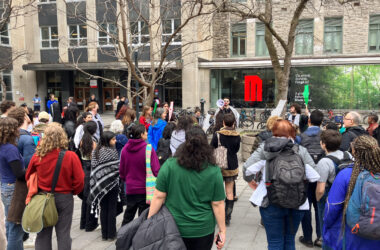The East Asian Studies department held a town hall session on March 23 to discuss the spike in anti-Asian racism in the United States and Canada. Over 50 participants, including faculty members and students, attended the town hall and engaged in discussions about their ongoing experiences. The department also released a statement standing with members of the community grieving from the shooting in Atlanta on March 19, where eight people—including six Asian women—were murdered.
The recent spike in anti-Asian racism involves acts ranging from microaggressions to physical violence, with many pointing to former U.S. President Donald Trump’s anti-Chinese rhetoric. The spike in incidents of anti-Asian racism is not confined to the United States: A Chinese Canadian National Council report from Sept. 2020 showed that since the pandemic, there were more hate crimes per capita against people of Asian descent in Canada than in the United States.
Yuriko Furuhata, associate professor in the East Asian Studies department who specializes in Japanese film and media, believes that the media of all sorts—including entertainment and news—plays a role in shaping public perception of minority communities. Furuhata explained that as an Asian American woman, she recognizes how deeply these tragedies can affect people, and emphasized that she wanted to provide a safe place for students.
“As someone who grew up in Japan and is now working and living in Canada, I recognize that I occupy multiple positionalities, and I would like to acknowledge that we cannot flatten differences and privileges within Asian communities,” Furuhata wrote in an email to The McGill Tribune. “As an educator, I also believe that knowledge based on solidarity can be empowering and collective learning is important in order to counter and fight against the power of negative knowledge such as racial and gendered stereotypes.”
Monica Batac, a PhD candidate in the School of Social Work, attended the town hall because she felt disheartened by McGill’s institutional silence on anti-Asian racism, and hoped for an opportunity to discuss the next steps to confront anti-Asian racism. A member of Pan-Asian Collective (PAC)—a Montreal-based organization that aims to empower Asian communities—Batac has often felt that McGill fails to offer resources to students to learn about Asian Canadian history.
“PAC should be celebrated for doing […] peer and popular education,” Batac wrote. “Many of the topics address pressing issues and untold histories, concerns, and movements we don’t even hear about in our university classrooms.”
During the Fall 2020 semester, Batac taught EAST 303—a Chinese studies topics class that focussed on “Unsettling Asian Migrations: Experimenting Pedagogies for Decolonization.” In her class, Batac integrated social work, feminism, and ethnic study pedagogies to discuss the impact of racism against people of Asian descent. Batac is grateful that her class allowed students to understand the Asian immigrant experience and wished there were more spaces—like the town hall—in which underrepresented communities can have such discussions.
“I am grateful for the opportunity to teach this one-time course, because the students and I left knowing the class community we created was unique,” Batac wrote. “It is a shame on McGill that such spaces are rare.”
The McGill administration spoke to The McGill Tribune on how they plan to address anti-Asian racism on campus. On behalf of the university, Media Relations Officer Frédérique Mazerolle emphasized that McGill is working to take concrete action to implement more equitable hiring processes and increase student awareness on racism in general, but did not mention any specific plans to prevent anti-Asian racism.
“Though we are making progress, this work is ongoing and more remains to be done,” Mazerolle wrote. “The EDI Strategic Plan and Action Plan to Address Anti-Black Racism are two recent examples of McGill’s efforts in increasing the representation and success of equity-deserving groups on campus [….] We are committed to a respectful and inclusive environment for students, staff, and faculty. Our priority is to ensure the success, well-being and safety of all.”









